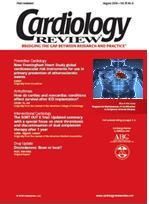The importance of preventive cardiology
Cardiology Review
This month's issue of features a Point-of-View article by Dr Goran P. Koracevicfrom Serbia. The article discusses the "heparin-rebound" phenomenon as it applies to cardiac patients, and the author concludes that two parallel meanings of the term "heparin rebound" have existed in the literature for over 45 years.
The combined CAD/Diabetes article by Drs Steven B.Shoemaker and Dominick J. Angiolillodescribes a pilot study that compared different doses of the antiplatelet agent clopidogrel in CAD patients with type 2 diabetes mellitus. In this study, 40 patients were randomized to 75-mg or 150-mg daily doses of clopidogrel. The results confirmed the impression that diabetic patients may need a larger dose of clopidogrel because of the high incidence of suboptimal responses observed in some patients. As Dr Stanley Katz notes in his commentary, when it comes to clopidogrel dosing, "one size doesn't necessarily fit all." The need for development in the antiplatelet arena is noted by Tracy E. Macaulay, PharmD, in this month's New Drug Update column, which examines prasugrel, an antiplatelet agent that is still undergoing clinical trials. If the drug were available for use today, it could potentially benefit those with inadequate platelet inhibition despite taking clopidogrel.
In the Lipid Disorders section, Dr Robert Clarkefrom the United Kingdom evaluated the role of blood lipids as a factor in mortality from ischemic heart disease in older men. The value of cholesterol fractions rather than total cholesterol is stressed in this epidemiological study, which included 5,344 male civil servants. Dr Michael W. Richprovides his insight on these findings.
In a Hypertension/Heart Failure article, Drs Sidney Glasofer and Peter M. Okinreport on the association between regression of left ventricular hypertrophy (due to hypertension) and new-onset congestive heart failure. The authors used electrocardiograms to monitor left ventricular hypertrophy (LVH), and found that regression of LVH attributed to treatment with losartan or atenolol resulted in a 36% reduction in subsequent hospitalization for heart failure. Dr Richard E. Stewartcomments on these findings, noting that patients who meet Cornell criteria for LVH by electrocardiographic assessment could be considered candidates for very aggressive pharmacologic or mechanical treatment of their hypertension early on, in the hope that progression to heart failure can be prevented.
,
Cardiology Review
In the Hypertension section, Dr Kaberi Dasgupta analyzes the emergence of sex differences in the prevalence of high systolic blood pressure in adolescents. The study, which included 1,267 adolescents, found that boys are more likely than girls to develop high systolic blood pressure as they approach adulthood. Being overweight is a risk factor in both sexes, but increased physical activity helps reduce the risk, as Dr WendyS. Post emphasizes in her commentary. As noted by Dr Carlos S. Ince, Jrthe new president of the Association of Black Cardiologists, the incidence of childhood obesity, diabetes, and hypertension is increasing disproportionately in African Americans compared with the general population; thus, behaviors that lead to these morbidities must be addressed at their earliest stages. Indeed the collective message of the reports in this month's issue of is that preventive cardiology is imperative, whether the patient has cardiovascular morbidities or is on the road to developing them.
—Peter F. Cohn
